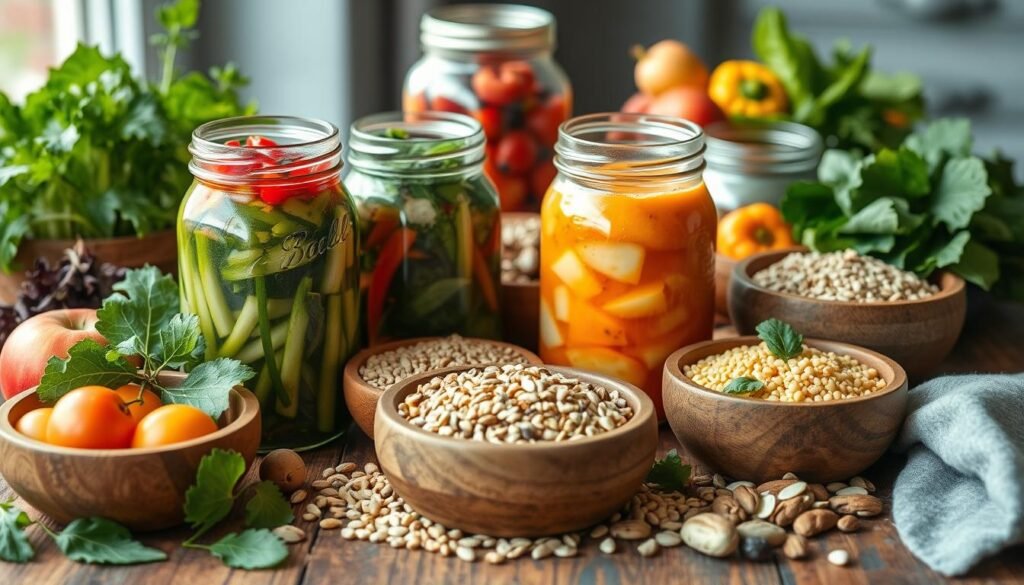Your gut is home to trillions of microorganisms that play a crucial role in your overall health. This complex ecosystem, known as your gut microbiome, influences everything from digestion and immunity to mood and energy levels. The microbiome diet focuses on nourishing these beneficial bacteria through strategic food choices that can transform your health from the inside out.
Research increasingly shows that the gut-brain axis—the communication network between your digestive system and brain—is fundamental to both physical and mental wellbeing. By incorporating probiotics (beneficial bacteria), prebiotics (food for those bacteria), and fermented foods into your daily meals, you can reduce bloating, enhance nutrient absorption, and strengthen your immune system.
This 7-day meal plan is designed to revolutionize your gut health by providing delicious, microbiome-friendly recipes that address the root causes of digestive discomfort while supporting your body’s natural healing processes.
A diverse selection of foods that support a healthy gut microbiome
The Microbiome Diet: Principles for Gut Health Success
Before diving into our 7-day meal plan, it’s important to understand the core principles of the microbiome diet. This approach focuses on removing foods that harm gut bacteria, repairing the gut lining, replacing digestive enzymes, and reinoculating your system with beneficial microbes.
Foods to Embrace:
- Fermented foods rich in probiotics (kimchi, sauerkraut, kefir)
- High-fiber vegetables and fruits with prebiotics
- Healthy fats from avocados, olive oil, and nuts
- Clean proteins like wild-caught fish and grass-fed meats
- Anti-inflammatory herbs and spices
Foods to Limit:
- Processed foods with artificial additives
- Refined sugars and high-fructose corn syrup
- Conventional dairy products
- Gluten-containing grains (initially)
- Factory-farmed meats with antibiotics
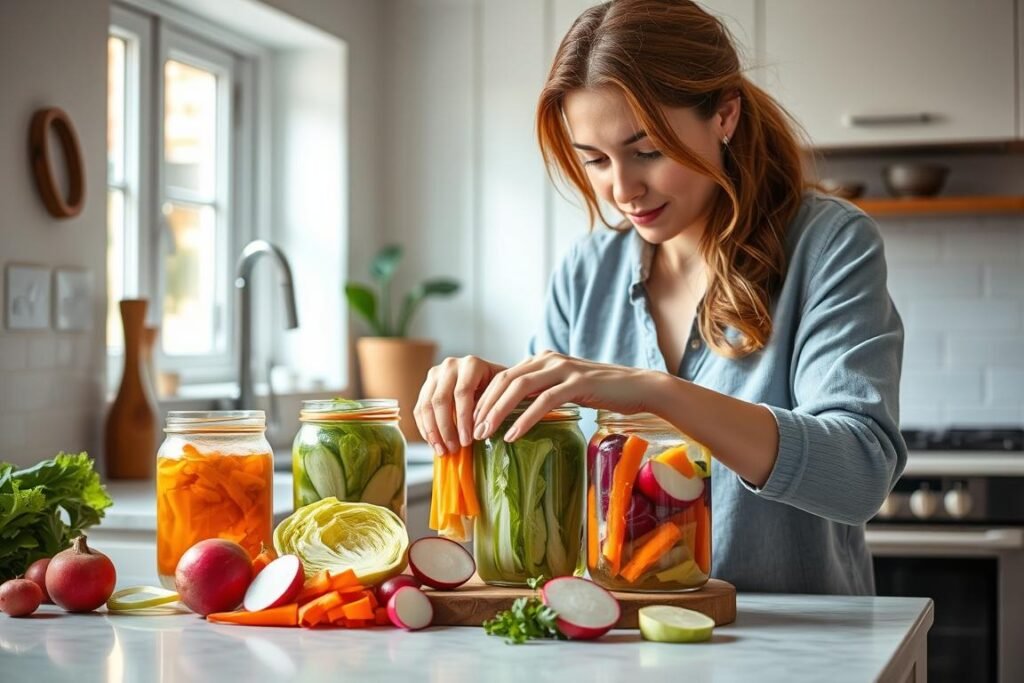
Preparing homemade fermented vegetables can significantly boost your intake of beneficial probiotics
Day 1: Microbiome Reset
We begin our journey with a gentle reset day that introduces key microbiome-supporting foods while removing potential irritants. Today’s meals focus on anti-inflammatory ingredients that help calm digestive distress and prepare your gut for healing.
Breakfast
Berry-Kefir Smoothie Bowl
- 1 cup plain kefir probiotic
- 1 cup mixed berries (antioxidants)
- 1 tbsp ground flaxseeds prebiotic
- 1 tbsp almond butter
- Cinnamon to taste
Nutritional note: Kefir contains multiple strains of beneficial bacteria that help diversify your gut microbiome, while berries provide polyphenols that feed good bacteria.
Lunch
Gut-Healing Chicken Soup
- Bone broth base (gut-healing)
- Shredded pasture-raised chicken
- Carrots, celery, onions, garlic prebiotic
- Fresh ginger and turmeric (anti-inflammatory)
- Fresh herbs (parsley, thyme)
Nutritional note: Bone broth contains collagen and amino acids that help repair the gut lining, while garlic and onions provide prebiotic fiber for beneficial bacteria.
Dinner
Wild Salmon with Roasted Vegetables
- 6 oz wild-caught salmon (omega-3s)
- Asparagus prebiotic
- Jerusalem artichokes prebiotic
- Olive oil and lemon
- Fresh herbs (dill, parsley)
Nutritional note: Wild salmon provides anti-inflammatory omega-3 fatty acids, while Jerusalem artichokes contain inulin, a powerful prebiotic that feeds beneficial gut bacteria.
Snack
Gut-Friendly Energy Bites
- 1/4 cup almond butter
- 2 tbsp ground flaxseeds prebiotic
- 1 tbsp raw honey (antimicrobial)
- 1/4 cup chopped walnuts
- Cinnamon and vanilla extract
Nutritional note: These no-bake bites provide healthy fats and fiber that support digestive health and help maintain stable blood sugar levels.
Hydration
Gut-Healing Teas & Waters
- Ginger tea (anti-inflammatory)
- Peppermint tea (digestive aid)
- Filtered water with lemon
- Bone broth (mid-afternoon)
Nutritional note: Proper hydration is essential for digestive health, while herbal teas provide additional anti-inflammatory and digestive benefits.
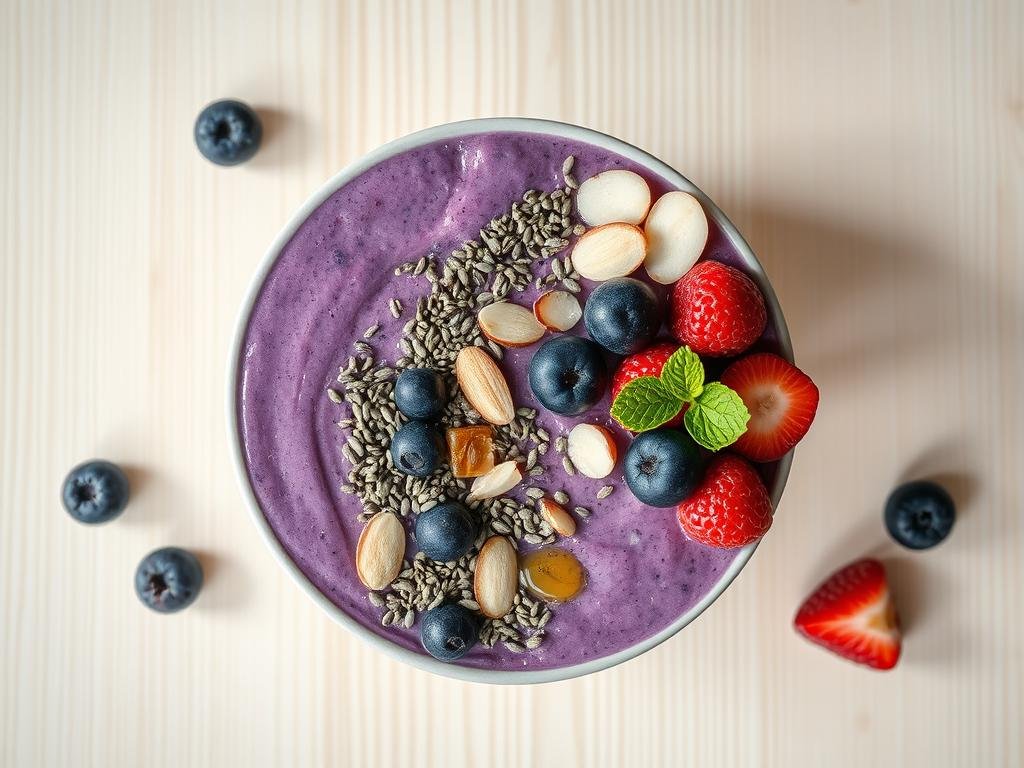
Berry-kefir smoothie bowl provides both probiotics and antioxidants for gut health
Day 2: Prebiotic Power
Today we focus on prebiotic-rich foods that feed your beneficial gut bacteria. These specialized plant fibers pass undigested through your stomach and small intestine, becoming fuel for probiotics in your colon.
Breakfast
Prebiotic Overnight Oats
- 1/2 cup gluten-free rolled oats
- 1 tbsp chia seeds
- 1 cup almond milk
- 1 small green banana prebiotic
- 1 tsp raw honey
- Cinnamon and vanilla extract
Nutritional note: Green (unripe) bananas contain resistant starch, a powerful prebiotic that feeds beneficial bacteria in your colon.
Lunch
Jerusalem Artichoke Soup
- 2 cups Jerusalem artichokes prebiotic
- 1 leek prebiotic
- 1 small onion prebiotic
- 2 cloves garlic prebiotic
- Bone broth
- Coconut cream
- Fresh thyme and parsley
Nutritional note: This soup is a prebiotic powerhouse, with Jerusalem artichokes providing one of the richest sources of inulin fiber available.
Dinner
Garlic-Herb Chicken with Roasted Root Vegetables
- Pasture-raised chicken thighs
- 6 cloves garlic prebiotic
- Fresh rosemary and thyme
- Roasted parsnips, carrots, and turnips
- Olive oil and lemon
- Side of sautéed dandelion greens (bitter greens support liver function)
Nutritional note: Garlic contains prebiotic compounds that specifically promote the growth of beneficial Bifidobacteria in your gut.
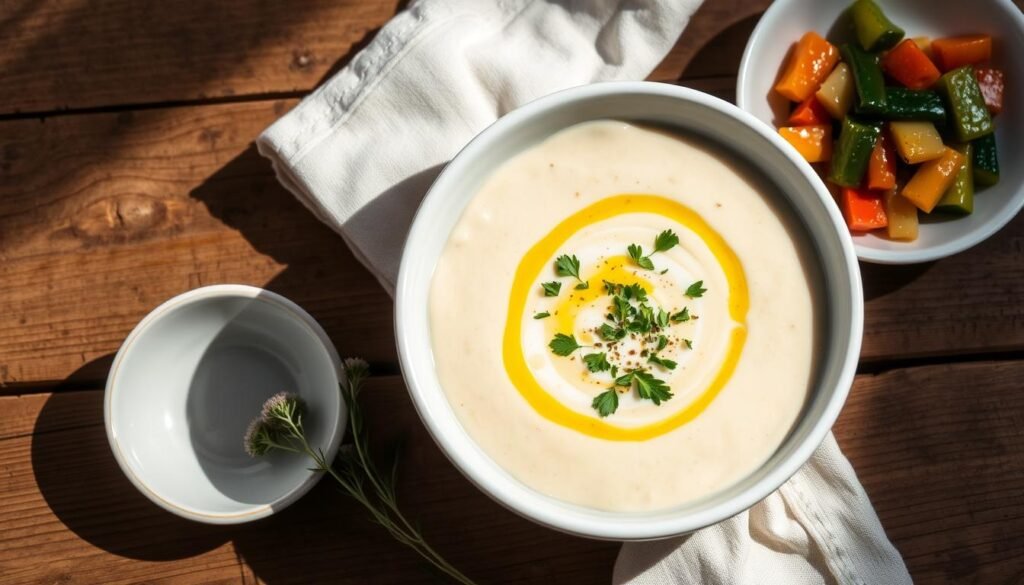
Jerusalem artichoke soup provides inulin, a powerful prebiotic fiber that feeds beneficial gut bacteria
Day 3: Fermentation Celebration
Today we highlight fermented foods, which introduce beneficial live bacteria directly into your digestive system. These traditional foods have been used for centuries to support gut health and enhance immunity.
Breakfast
Probiotic Breakfast Bowl
- 1 cup plain coconut yogurt probiotic
- 1/4 cup grain-free granola
- 1 tbsp ground flaxseeds
- 1/4 cup blueberries
- 1 tsp raw honey
Nutritional note: Coconut yogurt provides beneficial bacteria without the potential inflammatory effects of dairy, making it ideal for the initial phase of gut healing.
Lunch
Korean-Inspired Bibimbap Bowl
- 1/2 cup cauliflower rice
- 4 oz grass-fed beef
- 1/4 cup kimchi probiotic fermented
- Sautéed spinach and mushrooms
- 1 pasture-raised egg
- Sesame oil and seeds
- Gochujang sauce (optional)
Nutritional note: Kimchi contains numerous strains of lactic acid bacteria that support gut health and may help reduce inflammation.
Dinner
Miso-Glazed Cod with Fermented Vegetables
- 6 oz wild-caught cod
- 2 tbsp white miso paste probiotic fermented
- 1 tbsp raw honey
- Ginger and garlic
- Steamed bok choy
- 1/4 cup mixed fermented vegetables probiotic fermented
Nutritional note: Miso is a traditional Japanese fermented soybean paste that contains beneficial bacteria and enzymes that support digestion.
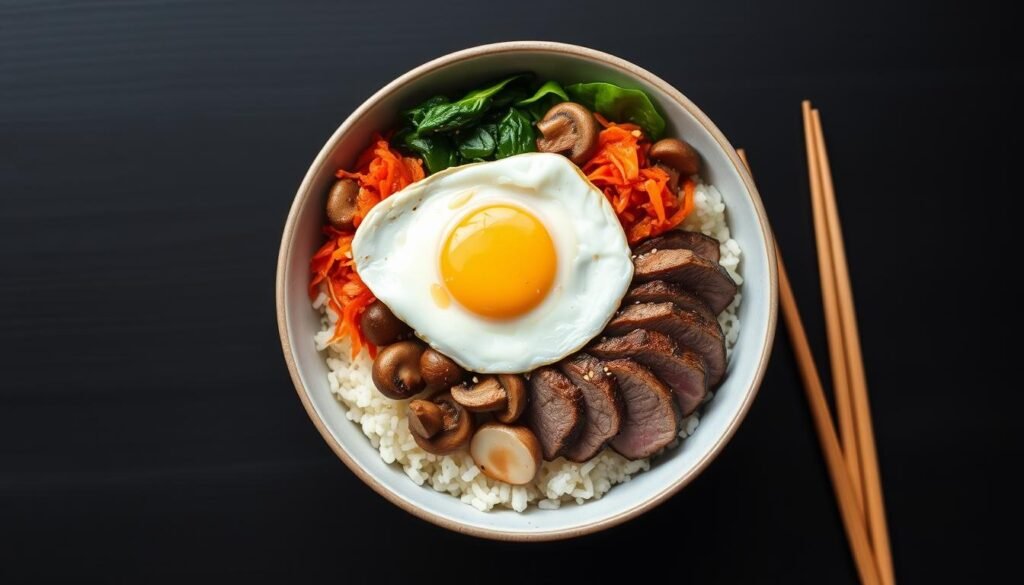
Korean-inspired bibimbap bowl featuring kimchi, a fermented food rich in beneficial probiotics
Day 4: Anti-Inflammatory Focus
Inflammation in the gut can disrupt the balance of your microbiome. Today’s meals incorporate powerful anti-inflammatory ingredients that help reduce gut inflammation and support healing.
Breakfast
Anti-Inflammatory Turmeric Smoothie
- 1 cup coconut kefir probiotic
- 1/2 frozen banana
- 1/2 cup frozen mango
- 1 tsp fresh turmeric root (anti-inflammatory)
- 1/2 tsp fresh ginger root
- 1 tbsp coconut oil
- Pinch of black pepper (enhances turmeric absorption)
Nutritional note: Turmeric contains curcumin, a powerful anti-inflammatory compound that can help heal the gut lining and reduce inflammation.
Lunch
Wild Salmon Salad with Sauerkraut
- 4 oz canned wild salmon
- Mixed greens and arugula
- 1/4 avocado
- 2 tbsp sauerkraut probiotic fermented
- Cucumber and radishes
- Olive oil and lemon dressing
- Fresh dill
Nutritional note: Wild salmon provides omega-3 fatty acids that help reduce inflammation, while sauerkraut adds beneficial probiotics.
Dinner
Anti-Inflammatory Turmeric-Ginger Soup
- Bone broth base
- Pasture-raised chicken
- Turmeric and ginger (anti-inflammatory)
- Carrots, celery, and onions
- Garlic and lemon
- Coconut milk
- Fresh cilantro
Nutritional note: This warming soup combines multiple anti-inflammatory ingredients that help reduce gut inflammation and support healing.
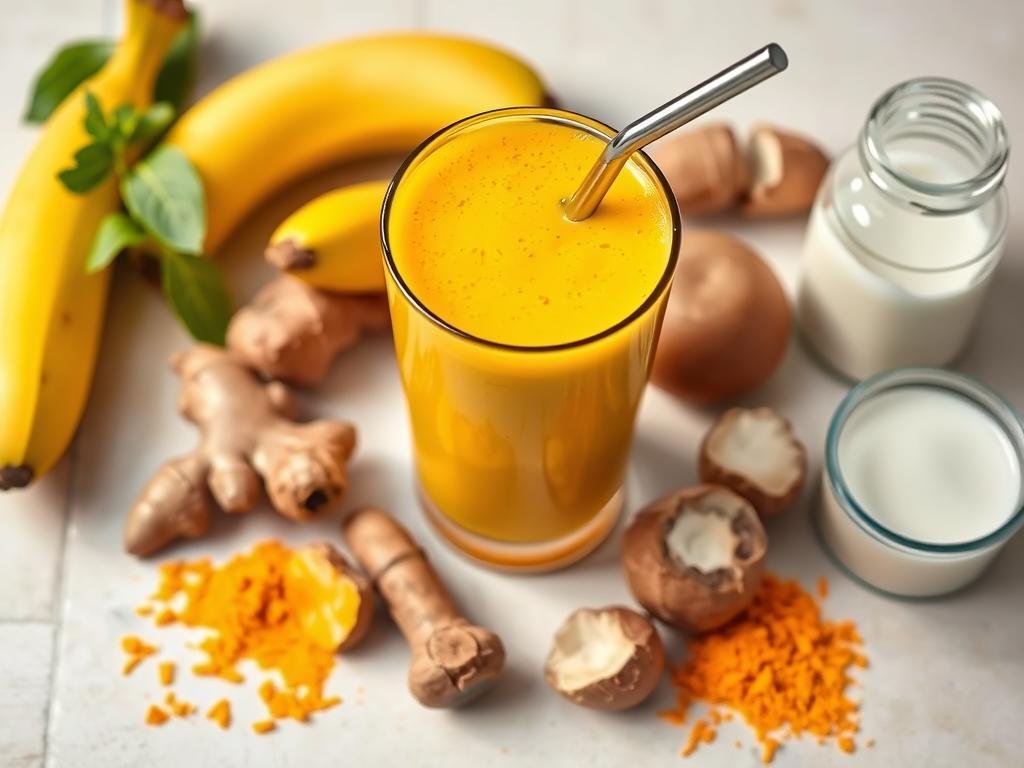
Anti-inflammatory turmeric smoothie combines probiotics with powerful anti-inflammatory compounds
Day 5: Fiber-Rich Diversity
Diverse fiber sources feed different beneficial bacteria strains. Today we focus on incorporating a wide variety of plant fibers to support microbiome diversity—a key marker of gut health.
Breakfast
Chia-Flax Pudding with Berries
- 2 tbsp chia seeds prebiotic
- 1 tbsp ground flaxseeds prebiotic
- 1 cup almond milk
- 1/2 cup mixed berries
- 1 tsp vanilla extract
- 1 tbsp almond butter
- Cinnamon to taste
Nutritional note: Chia and flax seeds provide soluble fiber that helps regulate bowel movements and feeds beneficial bacteria.
Lunch
Rainbow Buddha Bowl
- 2 cups mixed leafy greens
- 1/4 cup sauerkraut probiotic fermented
- 1/4 cup shredded purple cabbage
- 1/4 cup grated carrots
- 1/4 cup roasted sweet potato
- 1/4 avocado
- 2 tbsp pumpkin seeds
- 4 oz pasture-raised chicken
- Tahini-lemon dressing
Nutritional note: This colorful bowl provides diverse plant fibers and polyphenols that feed different beneficial bacteria strains.
Dinner
Lentil-Vegetable Soup with Bone Broth
- 1/2 cup red lentils prebiotic
- Bone broth base
- Carrots, celery, and onions
- Garlic and ginger
- Spinach or kale
- Fresh herbs (thyme, rosemary)
- Side of fermented vegetables probiotic fermented
Nutritional note: Lentils provide resistant starch and fiber that feed beneficial bacteria, while bone broth supports gut lining repair.
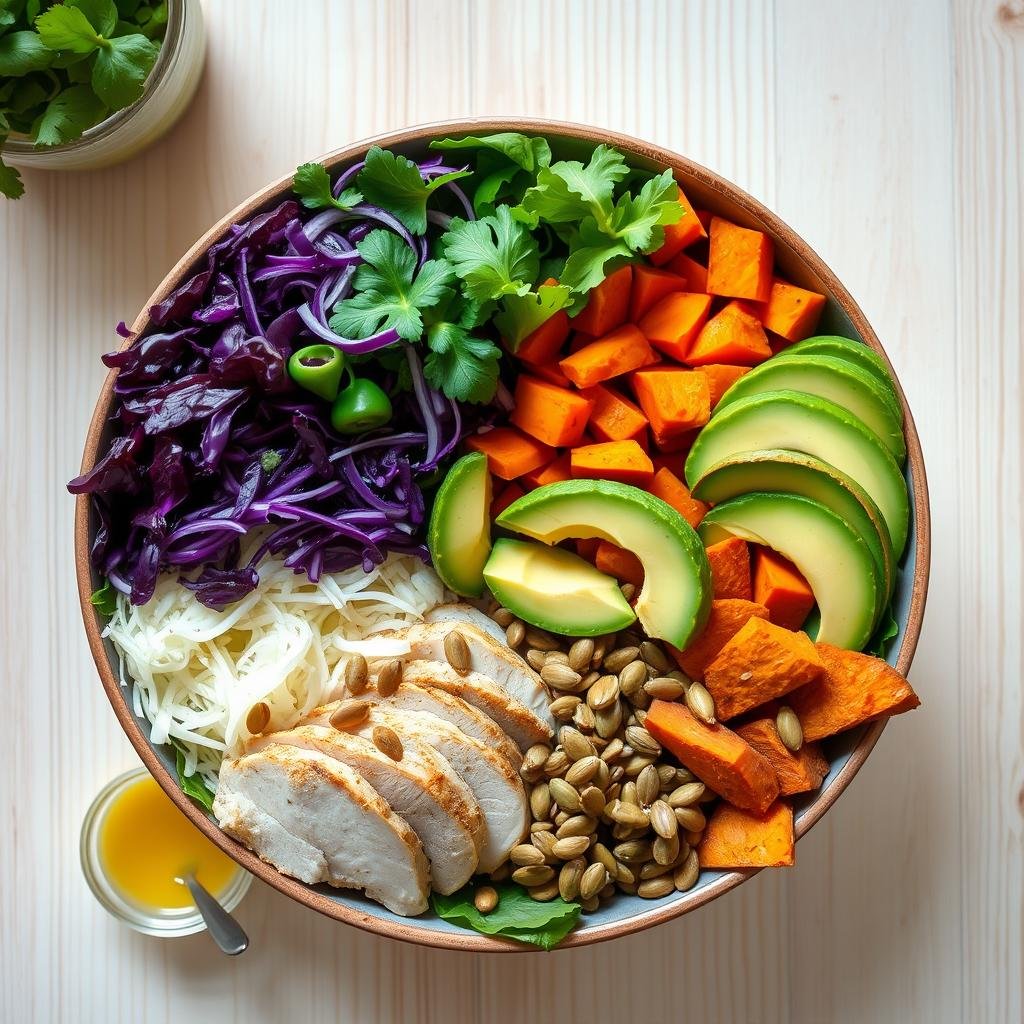
Rainbow Buddha bowl provides diverse plant fibers to feed different beneficial bacteria strains
Day 6: Digestive Enzyme Support
Proper digestion requires adequate enzyme production. Today’s meals incorporate foods that naturally contain digestive enzymes or stimulate your body’s enzyme production.
Breakfast
Pineapple-Papaya Smoothie
- 1/2 cup fresh pineapple (contains bromelain enzyme)
- 1/4 cup papaya (contains papain enzyme)
- 1 cup coconut kefir probiotic
- 1 tbsp coconut oil
- 1 tsp fresh ginger (digestive aid)
- 1 handful spinach
- Ice as needed
Nutritional note: Pineapple and papaya contain natural digestive enzymes that help break down proteins and support digestion.
Lunch
Digestive Support Salad
- Mixed bitter greens (arugula, dandelion)
- 1/4 avocado
- Fermented beets probiotic fermented
- Sauerkraut probiotic fermented
- 4 oz wild-caught salmon
- Apple cider vinegar dressing
- Fresh herbs (dill, parsley)
Nutritional note: Bitter greens stimulate bile production, which aids in fat digestion, while fermented foods provide beneficial bacteria and enzymes.
Dinner
Ginger-Turmeric Chicken with Roasted Vegetables
- Pasture-raised chicken thighs
- Fresh ginger and turmeric (digestive aids)
- Garlic and lemon
- Roasted Brussels sprouts
- Roasted carrots
- Olive oil and herbs
- Side of sauerkraut probiotic fermented
Nutritional note: Ginger stimulates digestive enzyme production and helps increase the movement of food through your digestive tract.
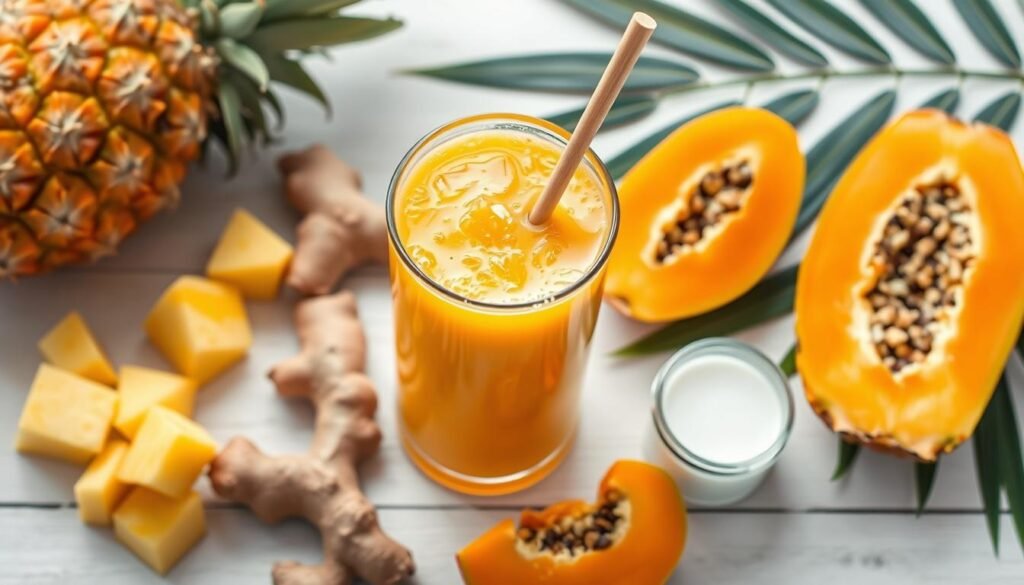
Pineapple-papaya smoothie combines natural digestive enzymes with probiotic-rich coconut kefir
Day 7: Microbiome Maintenance
Our final day focuses on sustainable practices that support long-term microbiome health. These meals incorporate a balance of all the principles we’ve covered throughout the week.
Breakfast
Probiotic Green Smoothie
- 1 cup kefir or coconut kefir probiotic
- 1 handful spinach
- 1/2 avocado
- 1/2 green apple
- 1 tbsp ground flaxseeds prebiotic
- 1 tsp fresh ginger
- Lemon juice
Nutritional note: This balanced smoothie provides probiotics, prebiotics, healthy fats, and greens for comprehensive gut support.
Lunch
Mediterranean Plate
- 4 oz wild-caught sardines (omega-3s)
- 1/4 cup hummus prebiotic
- Olive tapenade
- Cucumber and bell peppers
- Mixed olives
- Small side of fermented vegetables probiotic fermented
- Lemon and olive oil
Nutritional note: This Mediterranean-inspired plate provides a balance of omega-3 fatty acids, prebiotics from chickpeas, and probiotics from fermented vegetables.
Dinner
Gut-Healing Bowl
- Bone broth base
- 4 oz grass-fed beef
- Shiitake mushrooms (immune support)
- Bok choy and spinach
- Garlic and ginger
- Kimchi probiotic fermented
- Sesame oil and seeds
Nutritional note: This nourishing bowl combines gut-healing bone broth with immune-supporting mushrooms and probiotic-rich kimchi for comprehensive microbiome support.
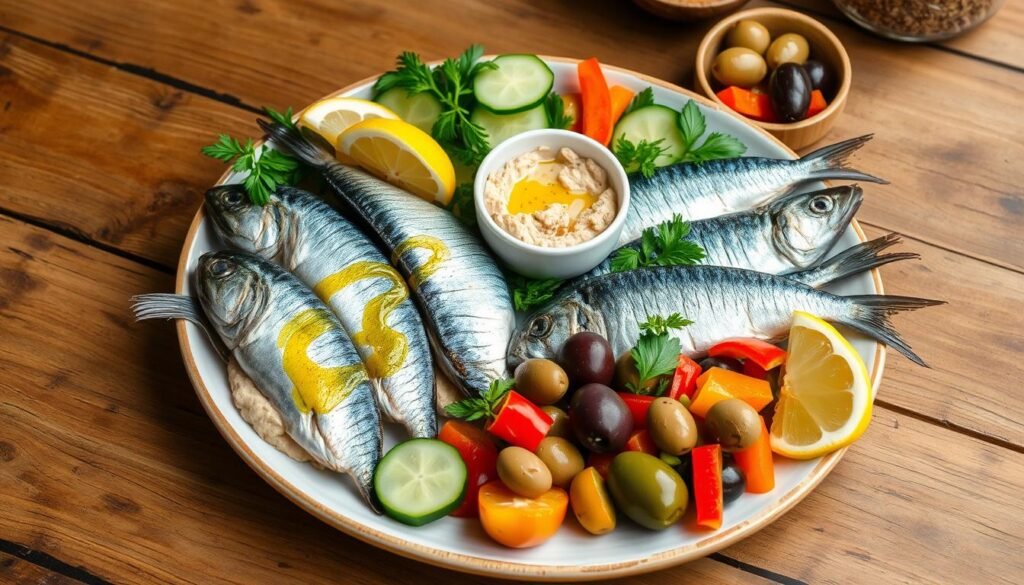
Mediterranean plate combines omega-3 rich sardines with prebiotic hummus and probiotic fermented vegetables
Microbiome Diet Shopping List
Here’s everything you’ll need to prepare your 7-day microbiome meal plan. This comprehensive list is organized by food category for easy shopping.
Proteins
- Pasture-raised chicken (thighs and breasts)
- Grass-fed beef (ground and steak)
- Wild-caught salmon
- Wild-caught cod
- Wild-caught sardines
- Pasture-raised eggs
- Bone broth (or ingredients to make it)
Fermented Foods
- Plain kefir (dairy or coconut)
- Coconut yogurt
- Sauerkraut
- Kimchi
- Miso paste (white)
- Fermented vegetables (beets, carrots)
Vegetables
- Jerusalem artichokes
- Garlic and onions
- Leeks
- Asparagus
- Carrots and celery
- Brussels sprouts
- Leafy greens (spinach, kale, arugula, dandelion)
- Bok choy
- Sweet potatoes
- Mushrooms (shiitake)
- Bell peppers and cucumbers
- Purple cabbage
- Parsnips and turnips
Fruits
- Mixed berries (blueberries, strawberries)
- Green bananas
- Avocados
- Lemons
- Green apples
- Pineapple
- Papaya
- Mango
Nuts, Seeds & Healthy Fats
- Almond butter
- Walnuts
- Pumpkin seeds
- Chia seeds
- Ground flaxseeds
- Sesame seeds
- Olive oil (extra virgin)
- Coconut oil
- Sesame oil
Herbs, Spices & Other
- Fresh ginger root
- Fresh turmeric root
- Fresh herbs (parsley, dill, cilantro, thyme, rosemary)
- Cinnamon
- Black pepper
- Gluten-free rolled oats
- Red lentils
- Chickpeas (for hummus)
- Raw honey
- Apple cider vinegar
- Coconut milk
- Almond milk
- Tahini
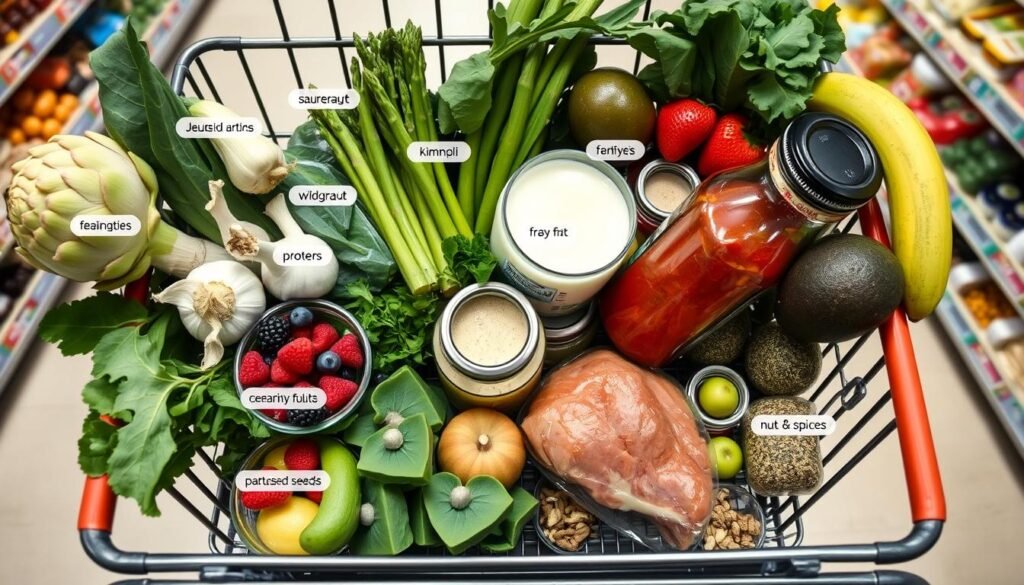
A well-organized shopping cart with all the essentials for your 7-day microbiome meal plan
Embracing the Microbiome Diet for Long-Term Health
This 7-day meal plan provides a solid foundation for improving your gut microbiome health. By incorporating diverse plant fibers, fermented foods, and anti-inflammatory ingredients while limiting processed foods and refined sugars, you’re creating an environment where beneficial bacteria can thrive.
The benefits of a microbiome-friendly diet extend far beyond digestive comfort. Research shows that a healthy gut microbiome is linked to improved immune function, better mood regulation through the gut-brain axis, reduced inflammation, and even healthier skin. Many people report increased energy, clearer thinking, and fewer food sensitivities after adopting this approach.
5 Tips for Maintaining Your Microbiome Beyond the 7-Day Plan
- Aim for 30+ plant foods weekly. Diversity is key for microbiome health. Try to incorporate at least 30 different plant foods each week to feed various beneficial bacteria strains.
- Include fermented foods daily. Make it a habit to include at least one serving of fermented foods like sauerkraut, kimchi, kefir, or yogurt in your daily meals.
- Prioritize fiber-rich foods. Most Americans consume less than half the recommended fiber intake. Aim for 25-35g daily from diverse sources to feed your beneficial bacteria.
- Limit antibiotics and antibacterial products. Use antibiotics only when necessary and avoid antibacterial soaps and cleaners that can disrupt your microbiome.
- Manage stress and prioritize sleep. Chronic stress and poor sleep negatively impact gut bacteria. Incorporate stress management techniques and aim for 7-9 hours of quality sleep.
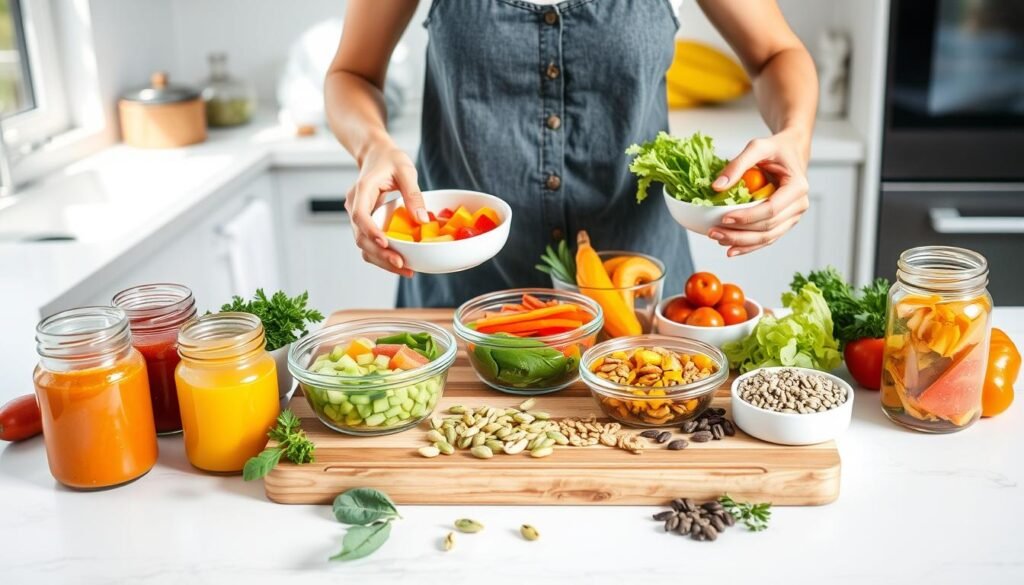
Preparing diverse, colorful foods is key to maintaining long-term microbiome health
Frequently Asked Questions About the Microbiome Diet
How quickly will I notice improvements in my gut health?
Can I modify this plan if I have food sensitivities?
Is this diet appropriate for vegetarians or vegans?
How does the microbiome diet differ from other popular diets?
Want the Complete Microbiome Diet Guide?
Get our extended 21-day meal plan with 40+ recipes, shopping lists, and personalized gut health tips delivered straight to your inbox.
Struggling with Digestive Issues?
Take our free gut health assessment to receive personalized recommendations based on your specific symptoms and health goals.
Ready to Transform Your Gut Health?
Join our 4-week Microbiome Reset Program and receive weekly meal plans, shopping lists, and expert guidance from our nutritionists.
Continue Your Gut Health Journey
Subscribe to our newsletter for weekly microbiome-friendly recipes, the latest gut health research, and exclusive tips from our nutritionists.

